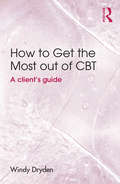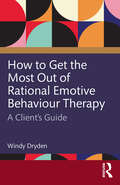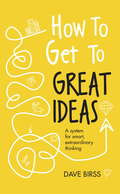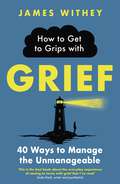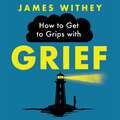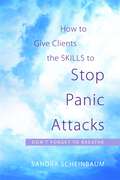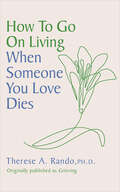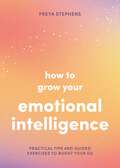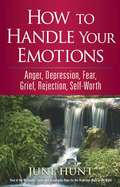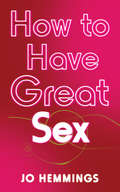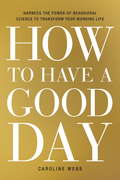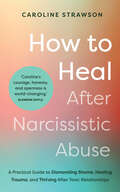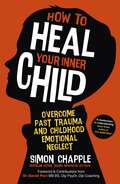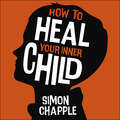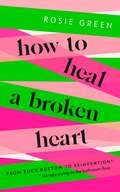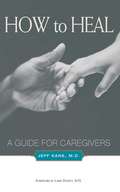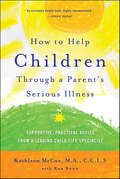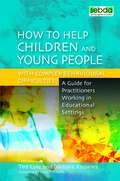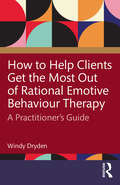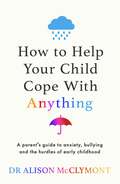- Table View
- List View
How to Get the Most Out of CBT: A client's guide
by Windy DrydenHow to Get the Most Out of Cognitive Behaviour Therapy (CBT): A client’s guide is aimed at those who are either considering consulting a cognitive behaviour therapist or who are actually consulting such a therapist. Written by one of the world’s leading CBT practitioners, it will steer you through the CBT process. The guide will help you to decide whether CBT is right for you, give you advice about how to make a therapeutic agreement with a therapist, show you how to prepare for CBT sessions and how to apply what you have learned from CBT after therapy has ended. How to Get the Most Out of Cognitive Behaviour Therapy (CBT) is a concise and practical guide that will help you to understand the CBT process and how to make the most of your therapy, no matter which CBT approach your therapist practises, so that you continue to benefit from it once therapy has ended and can learn to be your own therapist.
How to Get the Most Out of Rational Emotive Behaviour Therapy: A Client’s Guide
by Windy DrydenHow to Get the Most Out of Rational-Emotive Behaviour Therapy (REBT): A Client’s Guide is aimed at those who are either considering consulting or already seeing a Rational Emotive Behaviour Therapy (REBT) therapist.This book is designed to help guide clients through the REBT process from before they start through to when they are looking towards an end of therapy and next steps. The goal is not to discuss specific REBT practice methods, but rather provide a comprehensive guide to topics such as: How to decide if REBT is right for you How to prepare for your REBT session Understanding the process of change in REBT Learning to apply what you learn from REBT Therapy Sessions This concise and practical guide will help you to understand REBT, how to get the most out of each session and how you can ensure that you continue to benefit from it once therapy has ended.
How to Get to Great Ideas: A system for smart, extraordinary thinking
by Dave BirssThe highly practical lessons in How to Get to Great Ideas are based on neuroscience, psychology and sociology. Written by former advertising creative director Dave Birss, this book offers a brilliant new system for conceiving original and valuable ideas. It looks at how to frame a problem, how to push your thinking, how to sell the idea, how to build support for it and how to inspire others to have great ideas. It proves that any organization - and any individual or department within an organization - can create a fertile environment for ideas. Combining a practical research-based system with fascinating insights and inspiring and humorous writing, the book also includes the problem-solving system RIGHT Thinking. This is a tool which enables a more effective way to generate more effective ideas, and is one that anyone can use to transform themselves or their business. Training on this system is also available in person from the author. And will be released soon as an online course.
How to Get to Grips with Grief: 40 Ways to Manage the Unmanageable
by James WitheyThis book is for anyone who has lost someone. It may have been recently, or it may have been years ago, but still it stings like it was yesterday. James Withey has known the grief beast since he was five, when his dad died, and it has followed him ever since. In his twenty years supporting people with their own grief, as a counsellor and social care worker, he has helped others work through their despair and reconcile the injustice of grief. With his trademark humour and warmth, he provides forty ways to help you live with and manage your grief no matter what stage you're at. It provides comfort for when it all gets too much, ideas for when you feel at a loss for what to do and more than a laugh or two to balance out the sadness.
How to Get to Grips with Grief: 40 Ways to Manage the Unmanageable
by James WitheyThis book is for anyone who has lost someone. It may have been recently, or it may have been years ago, but still it stings like it was yesterday. James Withey has known the grief beast since he was five, when his dad died, and it has followed him ever since. In his twenty years supporting people with their own grief, as a counsellor and social care worker, he has helped others work through their despair and reconcile the injustice of grief. With his trademark humour and warmth, he provides forty ways to help you live with and manage your grief no matter what stage you're at. It provides comfort for when it all gets too much, ideas for when you feel at a loss for what to do and more than a laugh or two to balance out the sadness.
How to Get to Grips with Grief: 40 Ways to Manage the Unmanageable
by James WitheyThis book is for anyone who has lost someone. It may have been recently, or it may have been years ago, but still it stings like it was yesterday. James Withey has known the grief beast since he was five, when his dad died, and it has followed him ever since. In his twenty years supporting people with their own grief, as a counsellor and social care worker, he has helped others work through their despair and reconcile the injustice of grief. With his trademark humour and warmth, he provides forty ways to help you live with and manage your grief no matter what stage you're at. It provides comfort for when it all gets too much, ideas for when you feel at a loss for what to do and more than a laugh or two to balance out the sadness.
How to Give Clients the Skills to Stop Panic Attacks: Don't Forget to Breathe
by Sandra ScheinbaumHow to Give Clients the Skills to Stop Panic Attacks shows how it is possible to prevent and abort a panic attack through lifestyle change and mind-body relaxation. Presenting an effective approach rooted in the philosophy of functional medicine, this book proposes using calming breathing techniques as the foundation to controlling the anxiety that causes panic. Breathing is then combined with positive imagery, rational thinking, body awareness, nutrition and yoga to provide further support for sparking the real, positive change in clients that will guide them along the road to recovery. The practical tools, step-by-step exercises and motivational scripts within this book will provide an incomparable resource for mental health professionals, psychologists, counselors, and coaches.
How to Go On Living When Someone You Loves Dies
by Therese A. RandoLiving Life While Navigating the Death of a Loved One If you recently lost a loved one, How To Go On Living When Someone You Love Dies is the lifeline you are seeking. Dr. Therese A. Rando’s compassionate and comprehensive guide will help you navigate the storm and find your way back to solid ground. Whether dealing with sudden loss or mourning a long-anticipated passing, this book acknowledges that each person’s journey through grief is unique. It equips its listeners with the tools to understand and address their grief, communicate with children about death, attend to any unfinished business, and find support and other resources to help them move forward with their lives. Dr. Rando emphasizes the importance of self-care and encourages the acceptance of appropriate help and support from others. She provides practical strategies for managing grief during difficult times like the holidays, for planning funerals, and for creating meaningful personal rituals. First published in the late 1980s, Dr. Rando’s book is an enduring guide to the psychological, social, physical, spiritual, and practical aspects of loss. With decades of clinical experience and international acclaim, she is a leading expert on the grieving process. While this guide is intended for people who have lost a loved one, it is also a resource for carers, or anyone else, who wish to support someone navigating the path of bereavement. In the face of loss, this book is not just about surviving, but about living—truly and fully.
How to Go to Therapy
by Carl ShermanHow do you choose among hundreds of available therapies--offered by psychiatrists, psychologists, social workers, and counselors--to help you conquer painful feelings, unbearable anxiety, dysfunctional relationships, or out-of-control behavior? What are the sessions like? How will you know if your therapy is working and when it is time to stop? Veteran medical journalist Carl Sherman gives you the tools to make smart decisions about getting professional help.
How to Grow Your Emotional Intelligence: Practical Tips and Guided Exercises to Boost Your EQ
by Summersdale PublishersLearn how to manage your emotions and improve your people skills with this book, which is bursting with advice on emotional intelligence and how to harness itHow to Grow Your Emotional Intelligence is a practical guide filled with tips to help you hone your skills in the four key areas of emotional intelligence.
How to Handle Pressure
by Clyde M. Narramore Ruth E. NarramoreBack Cover: "pressure seems to be an unavoidable element of modern-day life. We can't escape it. In fact, many of us have not learned to cope successfully with the variety of pressures that come our way. In this book the Narramores suggest practical solutions for Christians seeking to handle pressure. They discuss such issues as time and money management, physical fitness, setting realistic goals, having a confidant to share our burdens, and living an organized life. These pave the way to peace of mind and contented living." Unlike other books of this genre, the Narramores integrate their psychology within a Christian worldview by quoting scripture references and referring to Biblical concepts from both the Old and New Testament. However, because this book has a psychological foundation to it, the non-Christian can gain insights by concentrating on the psychological information and by ignoring the Christian content.
How to Handle Your Emotions: Anger, Depression, Fear, Grief, Rejection, Self-worth
by June HuntThe first of an exciting new series of topical counseling resources offering God's truth for today's problems! Every person struggles with the common emotions related to anger, depression, fear, rejection, self-worth. How can we prevent negative emotions from getting the best of us? Longtime biblical counselor June Hunt looks to the Bible for the answers, offering compassionate guidance that encourages the heart and offers hope for even the most difficult situations. Each of the above topics is explored in four parts, examining the definitions, the characteristics, the causes, and the solutions that enable us to handle our emotions in ways that honor God and bless the people around us. At every step of the way, valuable insights are gleaned from Scripture. Written with a strong emphasis on practical applications that make a lasting difference, this guide is perfect for use by individuals, friends, small groups, and ministry workers.
How to Have Great Sex
by Jo HemmingsWhen you want to buy or rent your dream home, you go to an estate agent. When you want to learn to cook, you buy a recipe book from TV's latest celebrity chef. But who is there for you when you want to learn about having great sex? Or when you want to revive a flagging sex life? How to Have Great Sex is the answer. This step-by-step guide takes you from the underrated pleasures of a good snog through to the best positions for having that quickie in a forbidden place and gives you all the advice you need on:- How to initiate sex- How to talk dirty- How to give and get great oral sex- How to enjoy casual, safe sex - How to make love to the same partner for the rest of your lifeWhether you are a novice wanting to move on from the basics of the missionary position, or an experienced lover aching to know how to pep up your sex life, you'll find it all explained between these sheets in explicit, intimate, fun and supersexy detail.
How to Have a Good Day: Harness the Power of Behavioral Science to Transform Your Working Life
by Caroline WebbIn How to Have a Good Day, economist and former McKinsey partner Caroline Webb shows readers how to use recent findings from behavioral economics, psychology, and neuroscience to transform our approach to everyday working life. Advances in these behavioral sciences are giving us ever better understanding of how our brains work, why we make the choices we do, and what it takes for us to be at our best. But it has not always been easy to see how to apply these insights in the real world - until now. In How to Have a Good Day, Webb explains exactly how to apply this science to our daily tasks and routines. She translates three big scientific ideas into step-by-step guidance that shows us how to set better priorities, make our time go further, ace every interaction, be our smartest selves, strengthen our personal impact, be resilient to setbacks, and boost our energy and enjoyment. Through it all, Webb teaches us how to navigate the typical challenges of modern workplaces--from conflict with colleagues to dull meetings and overflowing inboxes--with skill and ease. Filled with stories of people who have used Webb's insights to boost their job satisfaction and performance at work, How to Have a Good Day is the book so many people wanted when they finished Nudge, Blink and Thinking Fast and Slow and were looking for practical ways to apply this fascinating science to their own lives and careers. A remarkable and much-needed book, How to Have a Good Day gives us the tools we need to have a lifetime of good days.From the Hardcover edition.
How to Heal After Narcissistic Abuse: A Practical Guide to Dismantling Shame, Healing Trauma, and Thriving After Toxic Relationships
by Caroline StrawsonI believe you. I hear you. I see you. And I'm here to help you find your power to heal and thrive, not just survive.Somatic trauma therapist and positive psychology coach Caroline Strawson wants to show you that your past is not your life sentence. No matter what&’s happened in your life, you can find joy, light, and happiness again.Integrating her own lived experience of narcissistic abuse with trauma-informed practices and positive psychology interventions, this book will help you heal and begin to feel like yourself again. You will learn:· to understand your core emotional wounds and begin to heal from your past· practical tools and exercises for engaging with the impact of narcissistic abuse, such as nervous system regulation, internal family systems theory, and the SELF Navigation Map· techniques to mitigate any potential triggers and develop compassion and kindness towards your inner child, such as grounding practices, somatic self-leadership, and meditations· how to turn pain into purpose, moving to a place of post-traumatic growthThis book will show you that you have the power to change the way you think and feel about the abuse that has happened to you, not because of you, and finally live the life you deserve to live – free from guilt and shame.It&’s time to take action. To do things differently. To step into your true self. To heal.
How to Heal Your Inner Child: Overcome Past Trauma and Childhood Emotional Neglect
by Simon Chapple'A masterclass in understanding' ANNIE GRACE, author of This Naked MindTen questions to ask yourself, right now:* Do you have a sense that something is wrong, but you don't know what it is?* Do you have a feeling that you are hollow inside, that you are empty or have a void within?* Do you react badly to rejection?* Do you often feel sad, unhappy or down for no obvious reason?* Would you describe yourself as highly sensitive?* Do you have problems with relationships and intimacy?* Do you engage in addictive behaviour - alcohol, drugs, gambling, shopping, food, sex, work, exercise?* Do you have low self-esteem or self-worth - are you not 'good enough'?* Do you have a sense of being numb to your feelings?* Do you rarely experience true joy and happiness?If you have answered 'yes' to most of these questions, there is a strong chance you have experienced emotional neglect or trauma as a child. An emotionally neglected child may struggle to form strong and secure attachments as an adult. They may feel hollow or empty, worthless (or overly important), judge themselves harshly and struggle with addictive tendencies - drinking, eating or exercising too much, for example. If this describes you, Heal Your Inner Child will change your life and give you back the love, compassion and authenticity you needed as a child, and deserve as an adult.Fomer heavy drinker turned sobriety coach Simon Chapple is - like you - a survivor of childhood trauma. His unique brand of straight-talking, practical yet reflective and relatable advice has helped thousands of people quit drinking, and he can help you now to move on from childhood emotional neglect to a place of happiness free from past trauma. How to Heal Your Inner Child is a stepped and safe approach to confronting your past, with space for reflective and supportive strategies that will help you to foster self-compassion and break free from the destructive behaviours that have blighted your life. Clinically endorsed and verified by a psychotherapist, this deeply personal, unflinchingly honest exploration is designed to unlock your own epiphany and support you as you journey to a happier, less troubled and more authentic self.
How to Heal Your Inner Child: Overcome Past Trauma and Childhood Emotional Neglect
by Simon Chapple'A masterclass in understanding' ANNIE GRACE, author of This Naked MindTen questions to ask yourself, right now:* Do you have a sense that something is wrong, but you don't know what it is?* Do you have a feeling that you are hollow inside, that you are empty or have a void within?* Do you react badly to rejection?* Do you often feel sad, unhappy or down for no obvious reason?* Would you describe yourself as highly sensitive?* Do you have problems with relationships and intimacy?* Do you engage in addictive behaviour - alcohol, drugs, gambling, shopping, food, sex, work, exercise?* Do you have low self-esteem or self-worth - are you not 'good enough'?* Do you have a sense of being numb to your feelings?* Do you rarely experience true joy and happiness?If you have answered 'yes' to most of these questions, there is a strong chance you have experienced emotional neglect or trauma as a child. An emotionally neglected child may struggle to form strong and secure attachments as an adult. They may feel hollow or empty, worthless (or overly important), judge themselves harshly and struggle with addictive tendencies - drinking, eating or exercising too much, for example. If this describes you, Heal Your Inner Child will change your life and give you back the love, compassion and authenticity you needed as a child, and deserve as an adult.Fomer heavy drinker turned sobriety coach Simon Chapple is - like you - a survivor of childhood trauma. His unique brand of straight-talking, practical yet reflective and relatable advice has helped thousands of people quit drinking, and he can help you now to move on from childhood emotional neglect to a place of happiness free from past trauma. How to Heal Your Inner Child is a stepped and safe approach to confronting your past, with space for reflective and supportive strategies that will help you to foster self-compassion and break free from the destructive behaviours that have blighted your life. Clinically endorsed and verified by a psychotherapist, this deeply personal, unflinchingly honest exploration is designed to unlock your own epiphany and support you as you journey to a happier, less troubled and more authentic self.
How to Heal Your Inner Child: Overcome Past Trauma and Childhood Emotional Neglect
by Simon Chapple'A masterclass in understanding' ANNIE GRACE, author of This Naked Mind: Control Alcohol, Find Freedom, Discover Happiness and Change Your LifeA recovery and growth handbook for anyone who feels empty - but doesn't know why.Ten questions to ask yourself, right now:* Do you have a sense that something is wrong, but you don't know what it is?* Do you have a feeling that you are hollow inside, that you are empty or have a void within?* Do you react badly to rejection?* Do you often feel sad, unhappy or down for no obvious reason?* Would you describe yourself as highly sensitive?* Do you have problems with relationships and intimacy?* Do you engage in addictive behaviour - alcohol, drugs, gambling, shopping, food, sex, work, exercise?* Do you have low self-esteem or self-worth - are you not 'good enough'?* Do you have a sense of being numb to your feelings?* Do you rarely experience true joy and happiness?If you have answered 'yes' to most of these questions, there is a strong chance you have experienced emotional neglect or trauma as a child. An emotionally neglected child may struggle to form strong and secure attachments as an adult. They may feel hollow or empty, worthless (or overly important), judge themselves harshly and struggle with addictive tendencies - drinking, eating or exercising too much, for example. If this describes you, Heal Your Inner Child will change your life and give you back the love, compassion and authenticity you needed as a child, and deserve as an adult.Fomer heavy drinker turned sobriety coach Simon Chapple is - like you - a survivor of childhood trauma. His unique brand of straight-talking, practical yet reflective and relatable advice has helped thousands of people quit drinking, and he can help you now to move on from childhood emotional neglect to a place of happiness free from past trauma. How to Heal Your Inner Child is a stepped and safe approach to confronting your past, with space for reflective and supportive strategies that will help you to foster self-compassion and break free from the destructive behaviours that have blighted your life. Clinically endorsed and verified by a psychotherapist, this deeply personal, unflinchingly honest exploration is designed to unlock your own epiphany and support you as you journey to a happier, less troubled and more authentic self.(P) 2021 Hodder & Stoughton Limited
How to Heal a Broken Heart: From Rock Bottom to Reinvention (via ugly crying on the bathroom floor)
by Rosie Green'The poster girl for divorce.' The Times'If you've ever had your heart broken (and who hasn't) Rosie Green's How to Heal a Broken Heart is your best friend. Honest, comforting and hopeful.' MARIAN KEYES'I love Rosie Green's writing.' ELIZABETH DAY'Brilliant. One of the few books that I've found that really describes what a broken heart feels like. It touched so many nerves.' VANESSA FELTZ'It reduced me to tears.' EMMA BARNETT, Woman's Hour, BBC Radio 4'It wasn't a conscious uncoupling. I had my heart ripped out and stamped on.'When Rosie Green's husband walked out after 26 years together, he declined to leave a forwarding address. Instead, he left a devastated woman who turned into someone she barely recognised: unable to eat or sleep, and so desperate to keep her family together she'd sacrifice her sense of self - and her dignity.She thought she'd never get over it. But she did. And so can you. This is the frank, uplifting and insightful book Rosie wished she could have found when her whole world fell apart. Here's your guide to getting through it - with advice from the experts, with the help of your friends, with a deliciously dark sense of humour and, for Rosie, with some highly inappropriate sex advice from her pre-teen daughter. Let her brilliantly honest handbook show how you can heal faster, understand yourself better and move on.How to Heal a Broken Heart doesn't sugarcoat it - heartbreak brings you to your knees. But, sometimes, it also gives you a necessary shove towards a happier, more fulfilled life than you ever dreamed was possible.
How to Heal: A Guide for Caregivers
by Jeff KaneThe ability to heal is not reserved for a gifted few. Anyone aching to ease the suffering of a sick friend or loved one can learn to become unconditionally present to the sick person rather than to the disease. Through stories filled with compassion, wisdom, and gentle humor, Dr. Jeff Kane shows readers how to use mindful attention, therapeutic listening, and truthful speech to help others heal.
How to Help Children Through a Parent's Serious Illness: Supportive, Practical Advice from a Leading Child Life Specialist
by Kathleen McCue Ron BonnHow to Help Children Through a Parent's Serious Illness has become the standard work on an important subject. A classic for over fifteen years, it continues to be a go-to book for supportive, practical advice, based on the lifetime experience and clinical practice of one of America 's leading child life practitioners.Fully revised and updated, this new edition also explores the major issues and developments from the last decade that affect children today, including the dangers and opportunities of the Internet, a deeper understanding of how hereditary diseases affect children, the impact of the nation's explosive growth in single-parent families, and new insights into how family trauma and a parent's mental illness may affect children.
How to Help Children and Young People with Complex Behavioural Difficulties
by Ted Cole Barbara Knowlesxx
How to Help Clients Get the Most Out of Rational Emotive Behaviour Therapy: A Practitioner’s Guide
by Windy DrydenThis book aims to assist therapists in helping their clients decide if Rational Emotive Behaviour Therapy (REBT) is for them and, if so, how to get the most out of the model.It does not seek to equip therapists with the particular REBT skills presented in training courses and skills-oriented books but rather strives to help therapists and their clients to be aware of and deal productively with more general issues that pertain to the effective practice of REBT. Topics covered include: Helping clients decide if REBT is for them. Helping clients prepare for their REBT sessions. Helping clients understand the process of change in REBT. Helping clients apply what they learn from REBT sessions. Helping clients become their own REBT therapist. This book is designed for all REBT therapists, whether experienced or in training.
How to Help Your Child Cope With Anything: The must-have guide to parenting resilient children
by Dr Alison McClymontFrom accredited child psychologist, Dr Alison McClymont, comes a book that bridges the gap between complex psychology and straightforward parenting advice.No parent can guard against everything but parental knowledge is power when it comes to the emotional development of your child, setting the solid foundation for every life interaction thereafter. Rooted in the latest science and explained very simply, this is a pioneering and accessible book that is a must-have guide for all parents who want to raise emotionally resilient children and teach them how to have a health relationship with their emotions.In How to Help Your Child Cope With Anything, Dr Alison McClymont delivers deep wisdom and unrivalled insights, drawing on revolutionary research and her extensive experience working directly with thousands of children. This book, packed with actionable takeaways and guide activities, will help you and your child to navigate experiences of bullying, grief, separation, anxiety, divorce, moving house and so much more.
How to Help Your Child Cope With Anything: The must-have guide to parenting resilient children
by Dr Alison McClymontFrom accredited child psychologist, Dr Alison McClymont, comes a book that bridges the gap between complex psychology and straightforward parenting advice.No parent can guard against everything but parental knowledge is power when it comes to the emotional development of your child, setting the solid foundation for every life interaction thereafter. Rooted in the latest science and explained very simply, this is a pioneering and accessible book that is a must-have guide for all parents who want to raise emotionally resilient children and teach them how to have a health relationship with their emotions.In How to Help Your Child Cope With Anything, Dr Alison McClymont delivers deep wisdom and unrivalled insights, drawing on revolutionary research and her extensive experience working directly with thousands of children. This book, packed with actionable takeaways and guide activities, will help you and your child to navigate experiences of bullying, grief, separation, anxiety, divorce, moving house and so much more.
